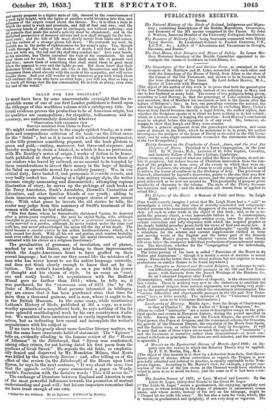SALAD FOR THE SOLITARY. * Jr must have been by some
unaccountable oversight that the re- spectable name of one of our first London publishers is found upon the titlepage of this worthless volume with a catchpenny title. In- ternal evidence proves the production to be of American origin, but its qualities are cosmopolitan ; for stupidity, tediousness, and in- accuracy, are unfortunately domiciled wherever
"Observation with extensive view Surveys mankind from China to Peru."
We might confine ourselves to the simple epithet trashy, as a com- plete and compendious criticism of the book—as the fittest sauce for the " Salad "; but as it is issued with a celebrated imprimatur, as the title promises something piquant, and the book glistens in green and gold,—costing, moreover, but three-and-sixpence, and thereby seeming to claim a kindred, to which it has no pretension, with Mr. Bentley's series of origiml works of fiction to be hence- forth published at that price —we think it right to warn those of our readers who travel by railroad, on no account to be tempted by these considerations to invest their money in the hope of finding the Salad an agreeable morsel for a solitary journey. We, in our critical duty, have tasted it, and pronounce it crambe recocta, and very badly cooked too. Aiming at a light gossipy style, the writer becomes simply unmeaning and disconnected ; attempting copious illustration of story, he serves up the pickings of such books as the Percy Anecdotes, Buck's Anecdotes, Disraeli's Curiosities of Literature, and other familiar friends of our youth ; adding to them inaccurate magazine and newspaper stories of more recent date. With what grace he invests the old stories he tells, the reader may judge from this summary of Swift's treatment of the women with whom he had relations.
"His first flame, whom he fantastically christened Varina, he deserted after a seven-years courtship ; the next he styled Stella, who, although beautiful in.person, and accomplished, after a protracted intimacy, he se- cretly marrted in a garden, although he never resided under the same roof with her, and never acknowledged the union till the day of his death. The third became a similar victim to his selfish hardheartedness; which, it is said, caused her death. With all his wit and genius, such wanton brutality must ever reflect the deepest disgrace upon his moral character, especially contrasted with his claims as a religious functionary."
The peculiarities of grammar, of involution, and of phrase, marked by us with Italics, may belong to those improvements which the Anglo-Americans boast to have grafted on their parent language ; but to our ear they sound like the mistakes of a man who has never learnt to use his native language correctly, and does not think clearly enough to know that art by in- tuition. The writer's knowledge is on a par with his power of thought and his charm of style. In an essay on "curi- ous and costly books," his acquaintance with the Bedford Missal goes no further than 1815; when, he tells us, it was purchased, for the "enormous sum of 637/. 15s." by the Duke of Marlborough. Most persons interested in bibliogra- phy are aware that it has been purchased since that time for more than a thousand guineas' and is now, where it ought to be, in the British Museum. In the same essay, while mentioning Latham's History of Birds, published at 50/. a copy, as a note- worthy specimen of a magnificent book, he says nothing of the far more splendid ornithological work by his own countryman Audu- bon. We mention these omissions not as vastly important in them- selves, but its indicating how casual and incomplete the writer's acquaintance With his subject is.
If we turn to his gossip about more familiar literary matters, we find the same loose inaccurate habit of statement. The " Epicure " tells us, evidently alluding to the famous review of the "Hours of Idleness" in the 'Edinburgh, that "Byron was condemned, among other crimes, for not having dated his first poem from the purlieus of Grub Street." He repeats the old fable, so emphatic- ally denied and disproved by Mr. Monckton Milnes, that Beats was killed by the Quarterly Review ; and, after telling us of the effect of the review (in the Edinburgh) of the Hours upon Lord Byron, he' says in the next sentence, "It was about the same time that the opposite critical organ commenced a paper on Words- worth's Excursion with the derisive words This will never do.'"
The exchange of literature between England and America is one of the most powerful influences towards the promotion of mutual understanding and good-will ; but let our importers remember that we have trash enough of our own.
• Salad for the Solitary. By an Epicure. Published by Bentley.


























 Previous page
Previous page